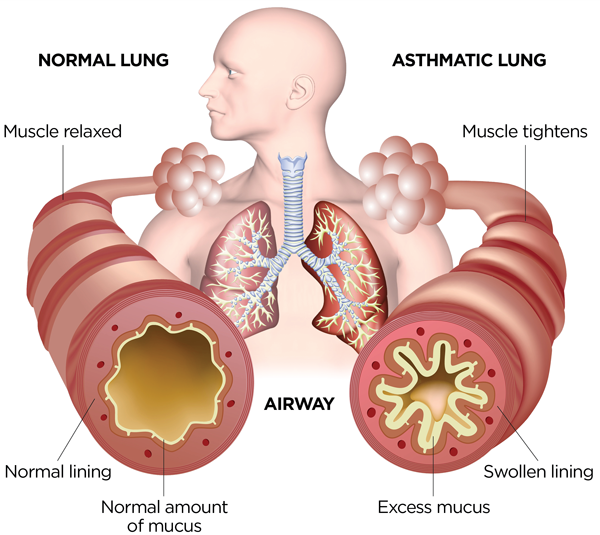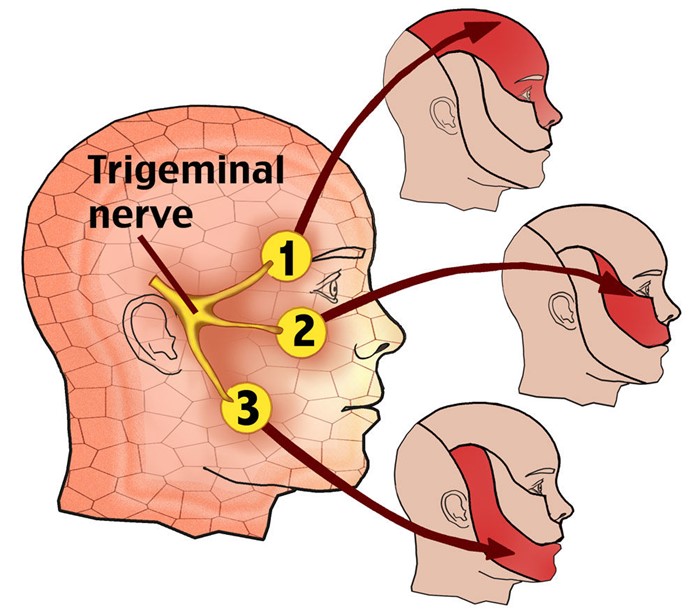A community health nurse is conducting an educational program on various environmental pollutants. The nurse should emphasize that clients who have which of the following disorders are especially vulnerable to ozone effects?
Mitral valve disease
Asthma
Nasal polyps
Seasonal allergies
The Correct Answer is B
Choice A reason: Mitral valve disease is not a disorder that makes clients especially vulnerable to ozone effects, as it does not affect the respiratory system. Mitral valve disease is a condition that affects the mitral valve, which is the valve that separates the left atrium and the left ventricle of the heart. Mitral valve disease can cause the valve to become narrow (stenosis) or leaky (regurgitation), affecting the blood flow and oxygen delivery to the body. Mitral valve disease can cause symptoms such as shortness of breath, fatigue, chest pain, palpitations, and swelling of the legs.
Choice B reason: Asthma is a disorder that makes clients especially vulnerable to ozone effects, as it affects the respiratory system. Asthma is a chronic inflammatory condition that causes the airways to become narrow, swollen, and sensitive to triggers such as allergens, irritants, infections, or exercise. Asthma can cause symptoms such as wheezing, coughing, chest tightness, and difficulty breathing. Ozone is a gas that is formed when sunlight reacts with pollutants in the air. Ozone can irritate the lungs and worsen asthma symptoms by causing inflammation, bronchoconstriction, and mucus production. Ozone can also reduce lung function and increase the risk of respiratory infections.
Choice C reason: Nasal polyps are not a disorder that makes clients especially vulnerable to ozone effects, as they do not affect the respiratory system. Nasal polyps are benign growths that form in the lining of the nose or sinuses. Nasal polyps can cause symptoms such as nasal congestion, runny nose, postnasal drip, loss of smell or taste, headache, and snoring. Nasal polyps are usually associated with chronic inflammation or allergies, but their exact cause is unknown.
Choice D reason: Seasonal allergies are not a disorder that makes clients especially vulnerable to ozone effects, as they do not affect the respiratory system. Seasonal allergies are allergic reactions that occur during certain times of the year when pollen or mold spores are high in the air. Seasonal allergies can cause symptoms such as sneezing, itching, watery eyes, runny nose, and sore throat. Seasonal allergies are caused by an overreaction of the immune system to harmless substances in the environment.

Nursing Test Bank
Naxlex Comprehensive Predictor Exams
Related Questions
Correct Answer is D
Explanation
Choice A reason: The AP's ability to complete the task without assistance is not one of the five rights of delegation. The nurse is responsible for providing adequate supervision and guidance to the AP, and ensuring that the task is done correctly and safely.
Choice B reason: The AP's ability to prioritize is not one of the five rights of delegation. The nurse is responsible for assigning tasks based on their urgency and importance and communicating clear expectations and deadlines to the AP.
Choice C reason: The AP's rapport with clients is not one of the five rights of delegation. The nurse is responsible for maintaining a therapeutic relationship with clients and respecting their preferences and needs.
Choice D reason: The AP has the knowledge and skill to perform the task is one of the five rights of delegation. The nurse is responsible for assessing the AP's competence and readiness to perform the task, and providing appropriate training and feedback if needed.

Correct Answer is D
Explanation
Choice A reason: Analgesics are medications that relieve pain by blocking pain signals or reducing inflammation. They include nonsteroidal anti-inflammatory drugs (NSAIDs), opioids, and acetaminophen. However, analgesics are not very effective in treating trigeminal neuralgia, as they do not address the underlying cause of the pain, which is the compression or irritation of the trigeminal nerve.
Choice B reason: Antihistamines are medications that block the effects of histamine, a chemical that causes allergic reactions such as itching, sneezing, and swelling. They include diphenhydramine, cetirizine, and loratadine. Antihistamines are not effective in treating trigeminal neuralgia, as they do not affect the trigeminal nerve or its function.
Choice C reason: Antibiotics are medications that kill or inhibit the growth of bacteria that cause infections. They include penicillin, amoxicillin, and ciprofloxacin. Antibiotics are not effective in treating trigeminal neuralgia, as they do not target the trigeminal nerve or its pathology.
Choice D reason: Anticonvulsants are medications that prevent or reduce the frequency and severity of seizures by stabilizing the electrical activity of the brain. They include carbamazepine, gabapentin, and phenytoin. Anticonvulsants are the most effective medications in treating trigeminal neuralgia, as they reduce the abnormal firing of the trigeminal nerve that causes the pain. Anticonvulsants are considered the first-line therapy for trigeminal neuralgia and can provide significant relief for most clients.

Whether you are a student looking to ace your exams or a practicing nurse seeking to enhance your expertise , our nursing education contents will empower you with the confidence and competence to make a difference in the lives of patients and become a respected leader in the healthcare field.
Visit Naxlex, invest in your future and unlock endless possibilities with our unparalleled nursing education contents today
Report Wrong Answer on the Current Question
Do you disagree with the answer? If yes, what is your expected answer? Explain.
Kindly be descriptive with the issue you are facing.
